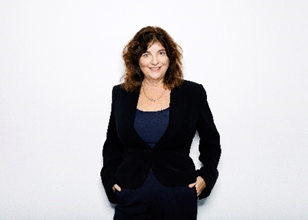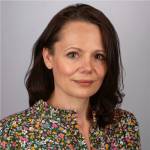Did you enjoy school?
I absolutely loved school. I went to the same all-girls school from age 7 to 18. It was ambitious for girls (unusual back then), offered lots of sport and extracurricular activities, was very nurturing and I am still close to many of my school mates.
What qualifications do you have?

When I was younger, my dream was to be a meteorologist, but didn’t have the option to do physics, and I was not predicted to get an A in Maths. The notion of having a career in data wasn’t an option and the only other pathway from university I could see was to be a teacher and that just wasn’t something for me. So I did a business degree in International Marketing and Languages but never lost my interest in technology and analytics. After university, I discovered the world of spatial analytics and GIS technology and as they say the rest is history. Roll on almost 40 years and now I am Partnerships director at Women in Data where I work with amazing companies who share our mission for gender parity in the data and tech space.
Has your career path been a smooth transition, a rocky road or a combination of both?
I deliberately chose to have a ‘Squiggly Career’. I chased opportunity and job satisfaction but my underlying desire was to ensure that whatever I did would make a measurable difference. So I moved from client side to vendor and back again – several times. In every move I learnt something new and brought something new and ensured that I could understand issues from different perspectives and bring empathy to every role.
What is the best career advice you can give to others?
- Deliver solutions not answers, and remember the data doesn’t make the decisions, people do.
- If you keep curious and keep learning you will stay relevant.
- Align everything you do to the business objectives, that way you have a greater chance of being heard and your ideas being implemented.
- Surround yourself with people who believe in you and will advocate on your behalf.
- Become a mentor and pay forward into your career.
And finally, we spend half of our life in work so make it a pleasure not a chore.
If you had to pick one mentor, that had the biggest influence on you, who would it be?
Ireland in the 1980s was not a place of enlightenment or progress from a gender equity perspective. My role model was Mary Robinson, a barrister, who championed the legalisation of contraception and divorce, the decriminalisation of homosexuality and the right women to sit on juries! She eventually became the first female to hold the office of President of Ireland and then the UN High Commissioner for Human Rights.
From where do you draw inspiration?
I draw inspiration from a passion to make a difference through the insights we can deliver. I am also inspired by the new talent that is coming into the industry. Their willingness to embrace change and challenge the status quo is refreshing and keeps me on my toes!
If you liked this content…
What is the biggest challenge you have faced to date?
There have been many career challenges along the way. I have lived through several economic downturns and organisation ‘right sizing’ (I so dislike this phrase!) I have faced redundancy and worse, had to make team members redundant, something that weighed very heavily with me. In a male dominated world I was often the only woman and had to develop strategies to be heard and ensure my view were seen as credible. There were times when I was overlooked for promotion or my input was minimised. However, these obstacles taught me resilience and additional skills that I have used throughout my career. They have also taken me to where I am today. At Women in Data I get to help other women benefit from my experience and carve the career they want in this fantastic industry.
What qualities do you feel makes a good leader?
I have spent the greatest part of my career avoiding the traditional hierarchical career advancement through people management. The best sportspeople do not always make the best coaches and vice versa. I try to lead by example, encouragement and support…and the strongly held belief that success is a function of effort and strategy rather than innate ability.
From a work viewpoint what has the last 12 months been like?
The last 12 months has been great from a work perspective. Women in data is going from strength to strength as we add more partners and members and have grown our community beyond 70,000 worldwide. Personally I am focussing on strengthening the learning and skills development of our Women in Data mission. This has taken me into a completely different realm, and I am enjoying the challenge and the opportunity to further support our amazing community.
What would you say are the biggest tech-based challenges we face today?
The biggest challenge is that tech is still being sold as a solution rather than an enabler. The latest hype cycle around AI is a prime example. So many businesses are seduced by the shiny new toy and forget that without appropriate data, diverse thinking and skilled balanced teams, their investment in technology will fail.
What can be done to encourage more women into the industry?
Only 17 percent of girls take stem subjects at school and approximately 20 percent of tech employees are women. So any woman who is carving a career in this sector is already a resilient superstar. Yet over half of these women will leave the industry by the age of 35. It is not enough to encourage more women into the industry if this is not a place for them to thrive. The argument for having more women in senior leadership is proven, so the tech industry needs to ensure that when it attracts female talent, that talent is nurtured and optimised through positive career paths, particularly into senior leadership.
Give us a fact about you that most other people wouldn’t know.
I was held at gunpoint during a robbery in my university summer job as a petrol pump attendant, but survived to tell the tale!







